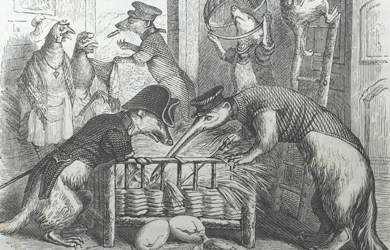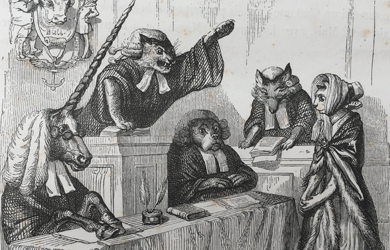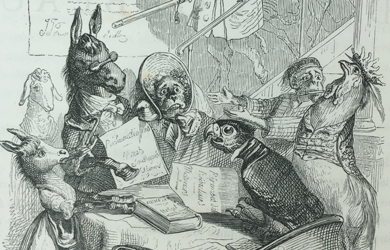Objectives
The programme on Exchanges of Economic and Political Ideas which began at the Centre for History and Economics in 2004 identified two substantial developments in recent historical scholarship: first, the investigation of large scale political, economic, and cultural systems, as in Atlantic history and Southeast Asian and Indian Ocean history, and second, the history of political and economic thought in a large context of economic, religious, and legal history; the initial object of the new programme was to connect the two kinds of history. In the five years since 2004, the first of the two developments, or the transnational turn, has become the dominant tendency in modern historiography, at least within North American, English, German and Hispanic scholarship.
It is the second development, or the "new history of economic thought", which has suggested the set of scholarly questions which we hope to explore over the coming five years. For the large-scale or transnational turn has changed both economic history and the history of economic thought in ways that are only gradually becoming apparent. In relation to the history of economic thought, the distinction between the high or scientific thought of economic theorists and the "medium" economic thought of public officials, entrepreneurs and publicists is especially elusive in relation to economic questions that traversed national frontiers: free trade versus protection, or the political economy of empire, or mobility and migration. The distinction between "medium" economic thought and the "low" economic thought of individuals in their ordinary lives is also elusive, especially in relation to the ideas which were "'in the air' of the age," in the expression of the English economic writer Walter Bagehot; and to the long-established assumption that the "standard of economic man," also in Bagehot's words, or the postulate of economic rationality, was itself a condition that varied across the frontiers of nations, cultures, and stages of economic development.[1]
The transnational turn has in addition subverted some of the long-established distinctions of economic history. Economic history is defined variously by its subject matter (economic life), its methods (the use of "tools borrowed from economics"), and the questions it asks ("how the economy evolves.")[2] But much of the evidence has been derived, like almost all statistical evidence, from national sources. An account of "globalization" as "commodity price convergence" is unpropitious for the sort of economic history that Marc Bloch anticipated in 1937, or a history of "the reactions of human beings in the presence of economic facts, their sentiments of insecurity or of confidence;" or for a "description of internal states of mind and their relation to external circumstances and events," as in Bernard Bailyn's account of the tendencies of modern historiography.[3]
Large-scale or transnational history has at the same time suggested extraordinarily rich sources of evidence for a new history of economic life. One reason is that by increasing the scale of historical investigation, which has liberated historians from the confining classifications of national historiography, transnational histories have impinged on other confining identities, including classifications into social history, economic history, intellectual history, cultural history, and political history. The increase in scale may in turn have freed historians to rediscover biography, prosopography, and the narratives of individual lives; a macro-turn which has made possible a micro-turn, or a new micro-history of long-distance connections.
The continuing problem for histories of "internal states of mind" is the absence of evidence, in respect of patterns of ideas, and also of the ideas of even the most self-conscious individuals. But the transnational histories which have been at the centre of the Exchanges of Economic and Political Ideas project are in several respects a remarkable source of this sort of evidence. One respect has to do with the law. Individuals in the Atlantic world, or in the Bay of Bengal, were caught in the web of the law in a multitude of different ways. The legal status of persons, commodities, and ships changed in the course of movement over long distances. To board a ship in the Atlantic was to cross a frontier, including the frontiers of different national systems of law, or of civil and common law, or of administrative, constitutional and admiralty law. Individuals married, gave birth, died, and inherited in different systems of law. They were naturalized, or lost their nationalities. They were enslaved, or bought their own emancipation. Entire islands crossed the frontiers of law, and entire plantations of individuals escaped from one legal system to another. All these transactions, or crossings, gave birth to an ocean of paper. So too did the commercial and financial transactions associated with long-distance and transnational connections, including the correspondence of commercial families and houses, ships' logs, port records, insurance records, and litigation over contraband.
The historians involved in the Exchanges of Economic and Political Ideas project have used legal sources in a variety of ways which we had only begun to imagine in 2004. The slave law of the diverse empires has been a source of evidence for economic and cultural history; so has admiralty law. There has been new research by scholars associated with the project on the changing law of citizenship and subjecthood; on the legal institutions of migration and servitude; on the reform of land rights and the codification of laws; on the enforced and unenforced law of customs regulations; on coroners' court and consular records; and on the changing conceptions of law in the European empires of the late eighteenth century, in the East Indies and North America. "I... observe the Word Illegal is somewhat frequent in your Correspondence, and I was also favored with a Sight of the Word Anté constitutional," the British Governor of the formerly French and Spanish colony of West Florida wrote in 1765; "I do acknowledge, the Word Civil, as sometimes opposed to Military Affairs, & as sometimes opposed to Criminal Affairs, & as sometimes opposed to Canon Law, and as sometimes opposed to Common Law, & as sometimes opposed to Statute Law, with many other Interpretations, are sufficient to bewilder Brains more distinct than those of West Florida." [4]
Economic theory was widely considered, until the late nineteenth century, as an integral part, in institutional and conceptual terms, of legal theory. The practice of the law, and of quasi-legal institutions, is in turn an extraordinary and under-used source for histories of economic and political life. The involvement with legal sources has arisen, in the course of the project, out of a variety of research interests. But the consequences of the uses of these sources for a new history of economic ideas have only become apparent towards the end of the project, and as an outcome of some of the collaborative work organized at the Centre for History and Economics; activities which both at Cambridge and at Harvard have involved legal historians from law schools and law faculties, as well as historians with an interest in the law. The history of the law, as Hendrik Hartog has shown, can be a history not only of legal doctrines but also of "habits and dispositions revealed by law," and of "individuals caught in the web of the law."[5] The law and the legal institutions of transnational or long-distance connections are a particularly promising subject, as the Exchanges project has shown, for this sort of history.
The new history of economic ideas, which is also a history of economic life, can even, in these circumstances, provide a space for collaboration between historians of economic thought, economic historians, and historians of business and merchant enterprises. A history of this sort would be post-materialist, in the sense of having recovered from the (vulgar) Marxist understanding of economic relationships as the determinants of ideas; and also in the sense of recovering, or trying to recover, from the other insidious inheritance of nineteenth-century materialism, or the economism in which ideals and ideas are "transitory and superficial, lobbying in some sense eternal and 'real.'"[6] It would be a return to the mid-nineteenth-century idyll of an "economic-cultural history," but emancipated, eventually, from the dominion of national history and national culture.[7] It would be an economic history which is emancipated, too, from the dominion of an understanding of economic theory as a vista of "rational fools," or "strong, silent men who never speak." [8]
The financial crisis of 2008, the continuing economic crisis, and the re-evaluation both of the economic policies of the past thirty years and of the economic theories on which the policies were based, have already had a substantial effect on the concerns of young scholars, as the Joint Centre's own experience suggests. It is reasonable to anticipate that at least some of the turbulence in economic thought and in ideas of economic change that was so characteristic of the 1930s -- the decade in which economic history was established as a distinctive discipline in France, the US and Britain -- will be repeated, in different form, in the coming five years. The Joint Centre for History and Economics hopes to be in a position, with the project on Exchanges of Economic, Legal and Political Ideas, to contribute to a new history of economic thought and economic life, for these new and changing times.
The proposed programme would be a continuation of the 2004-2009 project, and a development of the themes and ideas -- especially ideas about history and the law -- that have arisen in the course of the project. It would also take account of the ways in which the project has evolved, as a consequence of the new directions which we could not have predicted at the outset, including the major institutional development of the Joint Harvard-Cambridge Centre.
The new programme will be an undertaking, from the beginning, of the Joint Centre. We anticipate that all the workshops will involve participants from both Cambridge and Harvard, and that at least one will be organised each year in each university. The "exchanges" of research students, in the sense of visits by students to the two universities, and projects initiated by research students, have been among the most successful elements of the 2004-2009 project, and we hope to expand this part of the programme. Emma Rothschild, based both at Cambridge and at Harvard, will be the coordinator of the programme, and will work closely in the new programme with a core group of outstanding scholars associated with the Joint Centre: Sunil Amrith and David Todd, associate research fellows at the Cambridge Centre, and Alison Frank and Walter Johnson, faculty associates at the Harvard Center. There will be a continuing academic group for the new programme which will include Chris Clark (Cambridge), Tracy Dennison (Caltech/Cambridge), Tim Harper (Cambridge), William O'Reilly (Cambridge), Gareth Stedman Jones (Cambridge), Robert Travers (Cornell), and Richard Tuck (Harvard).
The programme, as in the earlier period, will involve two research fellowships over the five-year period. The expectation is that the people appointed to the research fellowships at Cambridge would spend a substantial part of their fellowship in Harvard, perhaps in the second year of a three-year fellowship. They might also enhance their existing research interests with a sustained involvement with another discipline and set of skills and sources; specifically, by spending a part of their fellowships working either with legal historians in the Harvard Law School or the Cambridge Law Faculty; or with economic historians in economics departments and business schools.
The programme of workshops will be drawn up on the basis of the research interests of the younger scholars involved in the coordinating and core groups. We expect the themes to include: migration and the law, especially in South and Southeast Asia (Amrith, Anderson, O'Reilly); the political economy of the French empire (Rothschild, Todd); slavery and free trade (Johnson, Todd); legal reform and property rights in land, in nineteenth-century Russia, Germany, and India (Bose, Dennison, Travers); petitions as political thought (Travers, Todd); Atlantic and Eastern Mediterranean history (Frank, O'Reilly); family history and the history of family law in British India (Travers, Stephens); the institutional and financial history of the 1850s (Clark, Stedman Jones, Luca Einaudi); and the history of economic rationality (Johnson, Rothschild).
Footnotes
1. The Collected Works of Walter Bagehot (London, 1978), vol. 3, pp. 330-332, 337. Bagehot described his father-in-law, the founder of The Economist, as a man of "'middle' principles" or "intermediate maxims," "a great belief producer," who diffused the truths, or the ideas, which were "'in the air' of the age." On the postulate or standard of economic man, see Walter Bagehot, Economic Studies (1880) (London, 1908), pp. 8-9, 22, 104, 109, 126.
2. Philip T. Hoffman and Jean-Laurent Rosenthal, "New Work in French Economic History," French Historical Studies, vol. 23, no. 3 (2000), 439-453, p. 439; Naomi R. Lamoreaux, "Rethinking Microhistory: A Comment," Journal of the Early Republic, 26 (Winter, 2006), 555-561, pp. 560-561.
3. Kevin H. O'Rourke and Jeffrey G. Williamson, "When did globalisation begin?", European Review of Economic History, vol. 6, no. 1 (April 2002), 23-50, p. 26. Marc Bloch, cited in Georges Lefebvre, "Le mouvement des prix et les origines de la Révolution française," Annales, vol. 9, no. 4 (1937), 138-170, p. 153; Bernard Bailyn, "The Challenge of Modern Historiography," The American Historical Review, vol. 87, 1 (Feb. 1982), 1-24, p. 22.
4. Letters of October 5 1765, January 28 1766 and April 1 1766 from Governor George Johnstone, in Mississippi Provincial Archives 1763-1766 English Dominion, ed. Dunbar Rowland (Nashville, Tenn., 1911), vol. 1, pp. 407-408, 450, 465; quoted in Emma Rothschild, The Inner Life of Empires (forthcoming, 2010).
5. Hendrik Hartog, Man and Wife in America: A History (Cambridge, MA: 2000), pp. 2, 5.
6. Eric Hobsbawm, "Where are British Historians Going?," The Marxist Quarterly, vol. 2, no. 1 (January 1955), 14-26, pp. 21-22.
7. The expression Nationalökonomische Culturgeschichte was used by the historical economist Bruno Hildebrand, in 1863, to describe a new historical political economy, "in the context of [im Zusammenhange mit] the history of the total political and legal development of nations and statistics." Bruno Hildebrand, "Vorwort," in Jahrbücher für Nationalökonomie und Statistik, vol. 1 (1863), p. 3. François Simiand, the inspiration of so much Annales history, wrote of the theory of "le Zusammenhang social," or the capacious social context, that it assumes that "everything is connected in social life; at a given moment, for a given people, there is a strict connection between the private, economic, juridical, religious, political and other institutions of this people;" and that it perpetuates the "traditional grouping of human facts according to country, nation, political unit." François Simiand, "Méthode historique et science sociale," Revue de synthèse historique, vol. 5 (1902), 1-22 and 129-157, pp. 3, 135-144.
8. Amartya Sen, Choice, Welfare and Measurement (Oxford, 1982), 9, 84.



